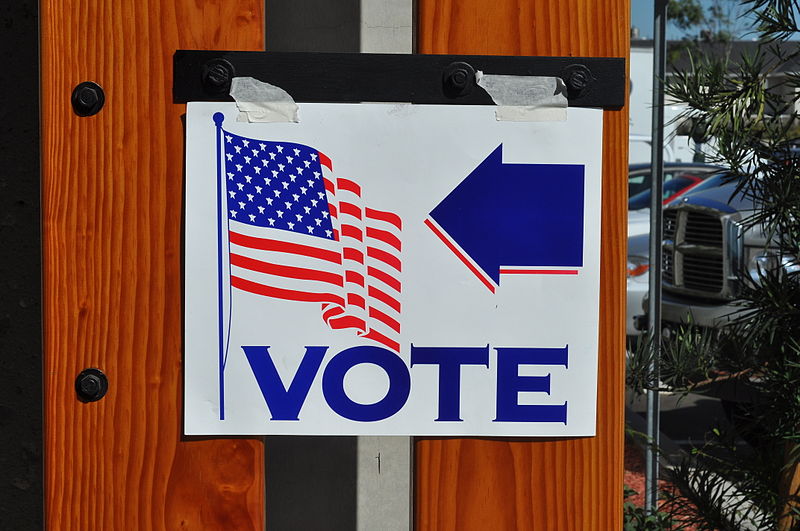Georgetown University is a part of an even greater community—that of Washington, D.C. This year, as Georgetown students gear up to vote, students registered to vote in D.C. will have the opportunity to vote not only in the presidential election but in D.C. races down the ballot.
How to vote
While voter registration in advance of the election closed on Oct. 13, those who haven’t yet registered but who are eligible to vote are able to in person on Nov. 3 with same-day registration. Students who have lived at a D.C. college address for at least the last 30 days are eligible to use that address to register to vote in the District.
All registered voters were sent an absentee ballot to their address in early October and are able to either mail in or physically drop off completed ballots at designated drop-off locations until 8 p.m. on Nov. 3. U.S. postal service experts are recommending voters who still have ballots should opt to drop them off, rather than mail them, if they can. In Ward 2, where Georgetown is located, there are five drop off locations, including at the Georgetown Library.
Early voting in person also began on Oct. 27 at 32 locations across the District, including three in Ward 2. Early voting locations are open from 8:30 a.m. to 7:00 p.m., while Election day voting occurs from 7:00 a.m. to 8:00 p.m. Similar to voting in person on Nov. 3, registered voters are not required to bring proof of residence but are recommended to bring some form of ID while early voting. Voters registering on Nov. 3 will also need to present proof of residence.
All mailed-in ballots postmarked by 8 p.m. on Nov. 3 and that arrive by or on Nov. 10 can be counted. Voters are able to track their individual ballot status here.
Races and issues on the ballot
While D.C. is not a U.S. state, since 1964 the District has had three electoral votes to award in the presidential race. In addition to Vice President Joe Biden and President Donald Trump, four other names are on the ballot for president, including Libertarian candidate Jo Jorgensen, Statehood Green Party candidate Howie Hawkins, and two independents, Gloria La Riva and Brock Pierce.
While the District lacks voting representation in Congress, its non-voting D.C. Delegate to the House of Representatives, incumbent Congresswoman Eleanor Holmes Norton (D-DC), is running for a 16th term in Congress, facing four independent candidates, a Libertarian Party candidate, a D.C. Statehood Green Party candidate, and a Socialist Workers candidate.
Additionally, D.C.’s current non-voting shadow Senator Paul Strauss (D-DC) is seeking a fourth six-year term. For the open shadow representative seat, Democratic candidate Oye Owolewa faces an independent and a D.C. Statehood Green Party for the open seat. Unlike Norton, neither shadow officeholder is officially seated in Congress.
The upcoming election also includes seats for two At-Large members of the D.C. Council, where a total of 24 candidates appear on the ballot. Each voter may select two candidates on the ballot. Incumbent Democrat Robert White is challenged by 20 Independent candidates, one Republican, one Green Party candidate, and one Libertarian. Despite the District’s Democratic bent, D.C. law prevents any more than two of the four At-Large council members from belonging to the same party. Independent At-large council member David Grosso is not running for re-election this November, leaving his seat vacated. White is expected to retain his seat.
In the Ward 2 City Council race, incumbent Councilwoman Brooke Pinto (D-Ward 2), who won her seat in a special election after a highly contested Democratic primary in June, is running for a full four-year term in the seat. Pinto has three opponents in the race: independent candidates Randy Downs and Martín Miguel Fernández, and D.C. Statehood Green Party candidate Peter Bolton.
Only once has a Democratic incumbent on the Council lost re-election in a general election, over 20 years ago in 1997. All of Pinto’s challengers claim to favor more liberal policies than the incumbent and while Republican candidate Katherine Venice was originally in the race, she dropped out in September and does not appear on the ballot.
Pinto’s Ward 2 City Council race is among similar races for Wards 4, 7, and 8. The elections for these wards are particularly significant, as their demographics are majority-Black and have been disproportionately affected by the COVID-19 pandemic.
In Ward 4, the incumbent Brandon Todd (D-Ward 4) lost the Democratic primary in June to progressive challenger Janeese Lewis George, who is running against D.C. Statehood candidate Perry Redd for the seat. Either candidate would likely be a significantly more progressive councilmember than Todd.
Only one candidate is on the ballot for Ward 7, Democratic incumbent D.C. Council member Vincent Gray (D-Ward 7). Gray also served as D.C. mayor from 2011 to 2015 before losing the Democratic primary to current Mayor Muriel Bowser. The Ward 8 race includes incumbent Democrat Trayon “Ward Eight” White (D-Ward 8), challenged by Republican Nate Derenge and independents Christopher Cole and Fred Hill.
Seats for the State Board of Education are also up for election. Six non-partisan candidates are running to be an At-Large member, and Wards 2, 4, 7, and 8 all have races for their ward’s seats.
Finally, on the back of each ballot is a referendum on Initiative No. 81, which would deprioritize law enforcement activities related to illegal “entheogenic plants and fungi,” including so-called ‘magic’ mushrooms. While the initiative would not legalize or decriminalize the mushrooms, it would put their illegal use among the “lowest law enforcement priorities.” The initiative is appearing on the ballot after a successful signature campaign, where over 25,000 signatures were collected over a period of around two months. Despite the support of several council members, Bowser has publicly stated that she opposes the initiative.
If you are eligible to vote in D.C. this November, you can vote until November 3rd.
This article has been updated to correct the spelling of Derenge’s name.






